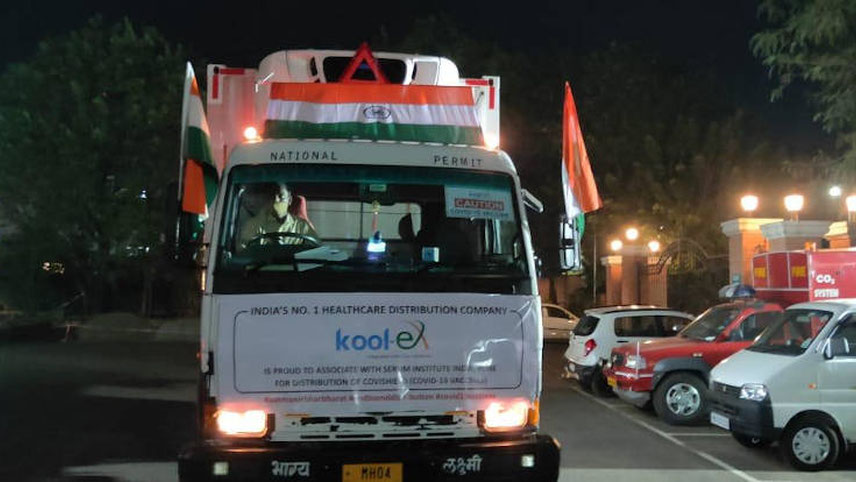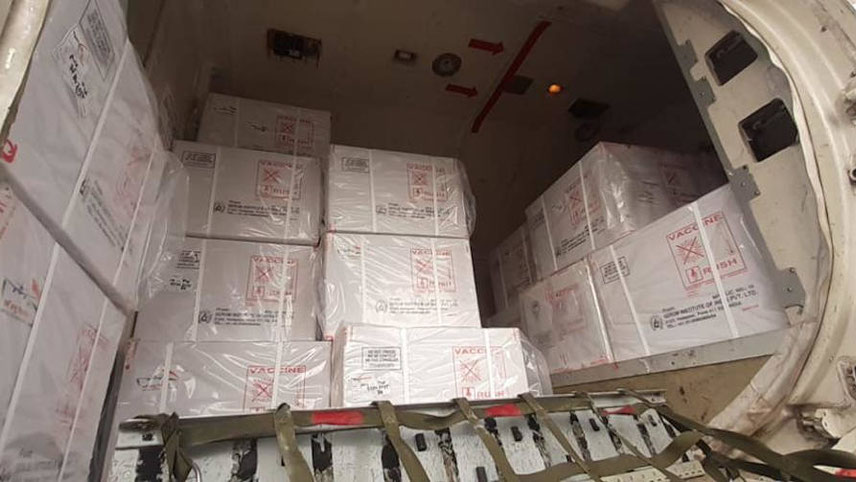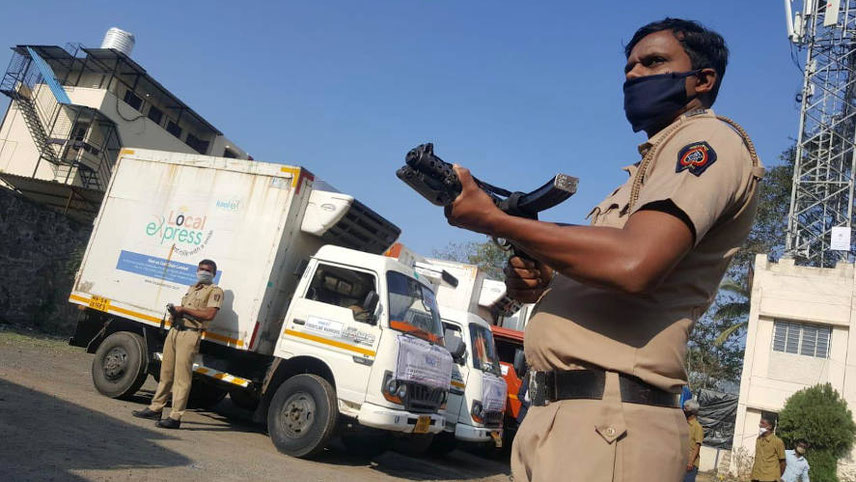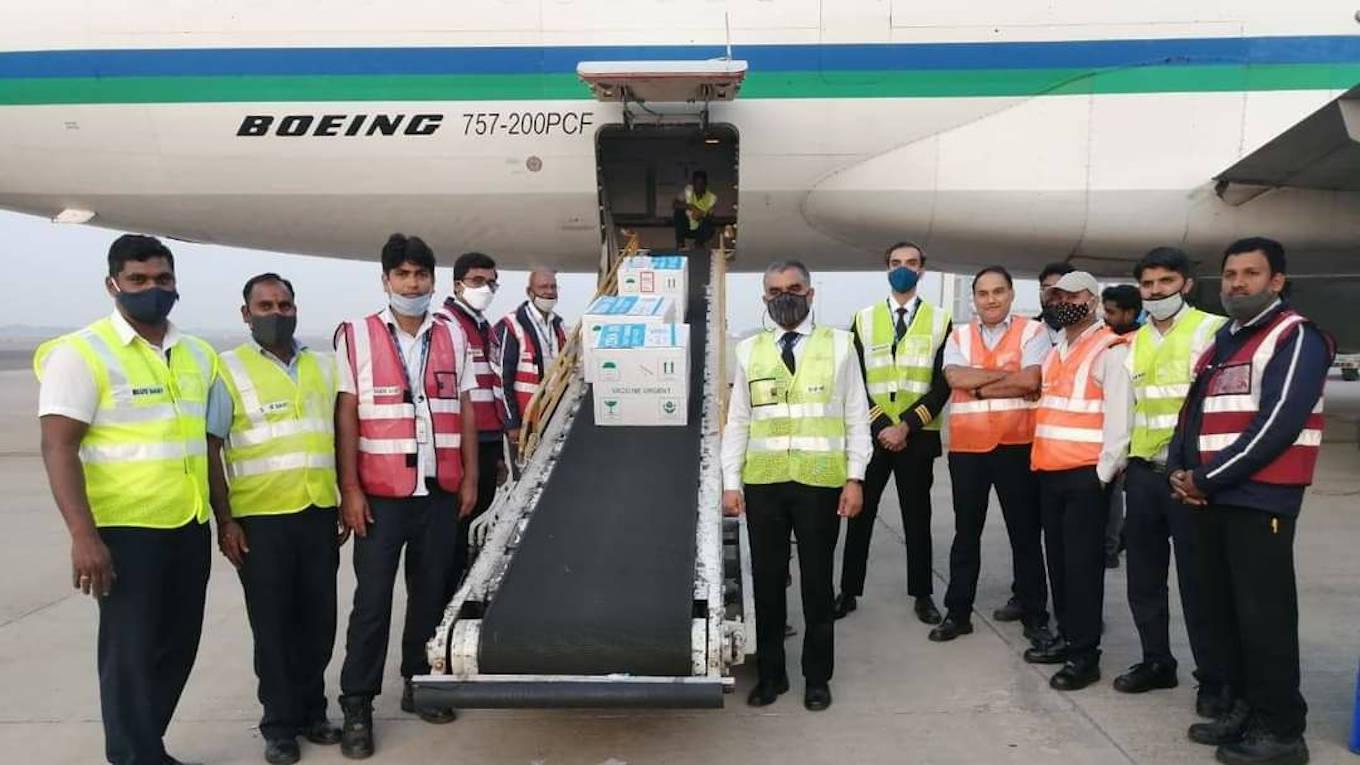-

For Koolex, transporting Covid-19 vaccine is a special moment
Preliminary trends
It turned out to be quite a photo op when the images of the first bunch of vaccines leaving the Serum Institute’s plant in Pune flashed on television and smartphone screens on 11 January. For a country which has reported the second highest volume of Covid-19 patients after the US, it was a moment of jubilation and hope, as it probably marked the beginning of the end of a long-drawn battle and also reflected national pride that Indian firms took the lead in delivering the antidote. But Kunal Agarwal, co-founder, Koolex Cold Chain, probably had those feelings even earlier, as the reefer vehicles of his firms were involved in the despatch process. “We are specialists in cold supply chain with a reefer vehicle fleet of 400 vehicles and we serve leading pharma firms for the transportation of their temperature-sensitive offerings. But undertaking Covid-19 vaccine transportation has been a special moment for us too,” says he.
When seen from the perspective of supply chain mechanism, analysts point out that it is typically assuming the character of a hub-and-spoke model distribution system – from plants in Pune (for Serum) and Hyderabad (Bharat Biotech) to major cities and state capitals and then to the interiors. And the Ministry of Health Affairs, which is spearheading the entire drive, has planned to use to the hilt the regional infrastructure, which is available for storage of vaccines under the command of government agencies. These include four government medical store depots (GMSDs) located in Karnal (Haryana), Mumbai, Kolkata and Chennai.
“All states have at least one state-level regional vaccine store each, which are temperature controlled, while some of the bigger states have more than one store. Uttar Pradesh has nine, Madhya Pradesh has four, Gujarat has four, Kerala has three, J&K has two, Karnataka has two and Rajasthan has two stores,” health secretary Ranjit Bhusan had said in a press meet in Delhi prior to the beginning of the vaccination drive. Apart from big GMSDs, over 50 storage points have also been identified at the state level, where vaccines will be routed either from the bigger depots or be directly supplied from manufacturers.
With this mechanism in place, the government, with the help of about 61,000 programme managers, 200,000 vaccinators and 370,000 other vaccination team members across the country, has kick-started the exercise with about 16 million vaccine doses procured from Serum Institute (11 million) and Bharat Biotech India (5.5 million), which were delivered to different strategic locations in the country by 15 January.
The two to eight degree Celsius temperature ambience required for the preservation of the two approved vaccines is also being viewed as a major blessing for the programme, since it does not need any special preparation on creating extreme temperature conditions like -70 degrees, which is mandatory for the management of the Pfizer vaccines currently distributed in the US and Europe. The next two vaccines which may find their way to the Indian market soon are Zydus and Sputnik and they also do not need freezing level ambience for preservation.
Moreover, as per industry buzz, gel ice packs, which can be effectively used in insulated containers to keep temperature conditions low for a long period, are also a tool that is readily available and likely to be used on a large scale, as the shipment volume mounts. “The kind of temperature ambience, which you need to maintain for these two vaccines even while in transportation, can be easily achieved by effective use of solutions like gel ice packs or chiller boxes for a period of up to 120 hours. It is cost-effective and it is going to be extensively used here in vaccination distribution. Every bit of road transportation of these vaccines does not necessarily require deploying a full-fledged reefer vehicle,” says Virendra Choudhary, co-founder & director, Algor Supply Chain, which also specialises in cold chain-centric solutions.
-
The kind of temperature ambience, which you need to maintain for these two vaccines even while in transportation, can be easily achieved by effective use of solutions like gel ice packs or chiller boxes for a period of up to 120 hours. It is cost-effective and it is going to be extensively used here in vaccination distribution
Action to grow manifold
As per the narrative emerging from the logistics industry, the current involvement of dedicated supply-chain service providers in the vaccine distribution drive is more in the sphere of transportation (road or airways) than storage. “In the initial week of transportation of vaccines from the factory to different locations with an estimated weight of 50 tonnes (25 per cent of them also ferried by airways), the total business would not have amounted to more than Rs20-25 crore,” says a top executive of a leading domestic logistics firm.
However, even as the business ticket size may have been small, there has been a bunch of agile players, who have joined hands with private manufacturers and government agencies, ensuring a smooth flow across the supply chain. And they are all expecting the business to grow big, as the vaccine drive moves beyond frontline workers.
Domestic aviation major SpiceJet, which has also emerged as an air cargo power house in the last couple of years, has clearly been in the forefront in vaccine transportation and distribution. “On 19 January, SpiceJet shipped 122 boxes of Covid-19 vaccine weighing 4.1 tonnes from Pune to Hyderabad, Vijayawada, Bhubaneswar, Patna and Leh – moving 38 boxes of vaccine to Patna, 35 boxes to Vijayawada, 30 boxes to Hyderabad, 28 boxes to Bhubaneswar and one box to Leh from Pune via Delhi,” a senior official of the airline confirmed on 20 January.
This was the second round of Covid-19 vaccine transportation flights operated by SpiceJet. Earlier, on 12 January, the airline had shipped 364 boxes, weighing 11 tonnes, of nearly four million doses of Covid-19 vaccine from Pune and on 13 January carried 111 boxes weighing 3.5 tonnes of Covid-19 vaccine from Mumbai, Pune and Hyderabad to a host of cities across India.
Domestic air express major Blue Dart, with six dedicated Boeing 757 freighters in its fleet and over 20,000 ground vehicles, has also gone into action mode, as it ferried some consignments of Bharat Biotech. “We have ramped up our Pharma Grade Conditioning Rooms located at eight strategic locations. These rooms are close to our Blue Dart Stations, which help increase our turnaround time and will aid in speedy delivery. We also use both single-use packaging (which provides temperature stability for 48-72 hours) and multiuse boxes which provide temperature stability for 96 hours,” says Ketan Kulkarni, CMO & head, business development, Blue Dart.
-

Wings of hope: vaccine inside SpiceJet aircraft
On the ground transportation side, players like Koolex, which have already made a beginning, are expecting a rapid rise in the volume, going ahead. “After 11 million doses transported in the earlier round, we are expecting another 20 million doses will be required to be transported in the coming days,” Kunal Agarwal told Business India in the middle of the last week. And there are a host of other major players in the 3PL space like OM Logistics or cold chain specialist Snowman Logistics waiting to join the action. Incidentally, in anticipation of getting deep into vaccine-centric delivery and supply chain services, SpiceJet had signed MoUs with both these companies in early December.
“We have invested in some reefer trucks and will deploy them in service when they are needed. But we are not looking at it as a business proposition. It is more like our contribution to a national cause,” says Akash Bansal, head (logistics), Om Logistics. “We have 15 cold chain centres across the country. And we can quickly provision for their usage in Covid-19 vaccine storage,” adds Sunil Nair, CEO, Snowman Logistics. Incidentally, after the news appeared early last month that Snowman would be collaborating with SpiceJet in its logistics management of vaccines, there was a considerable spike in its stock price for a brief spell, pushing it to a 52-week high level.
With India expected to use 600 million doses over the next six-to-eight months as its vaccination programme moves beyond the preliminary stage, the action would manifold from the logistics management perspective. ‘Made in India’ vaccines have already begun finding their way to neighbouring countries (a small volume was exported to Myanmar and the Maldives on 20 January, carried by Air India) and they will soon be routed to other corners of the planet as well. At some stage, vaccines made by Pfizer and other firms may also be selectively sent to India. Considering this scenario, global logistics service providers who have a firm footing in India, are also looking to become part of the action.
“We have already formally proposed to the government agencies that we can provide our global network and multi-modal infrastructure for outward-inward flow and storage of vaccines. We are yet to hear from them,” says a senior official of a global logistics major, who did not wish to be named. According to Ketan Kulkarni of Blue Dart, which is owned by the DHL group, the company is well-poised to serve the vaccination logistics drive on a larger basis, considering the strength of its parental firm. “As a part of the DPDHL group, we have access to a larger set of assets like reefer vehicles and cold storage trucks, access to a global shipping network at scale, as well as local freezer and storage capacity and know-how with in-country logistics,” he points out.
-

All set for last-mile delivery to distant corners
SpiceJet, meanwhile, signed a Memorandum of Understanding (MoU) with Belgium’s Brussels Airport early this month, for providing seamless transportation of the Covid-19 vaccine. The partnership entails both SpiceJet and Brussels Airport Co NV, jointly working with the government, pharma companies and forwarders, to ensure a reliable ecosystem for vaccine delivery in a temperature-controlled environment.
“Apart from helping SpiceJet to seamlessly transport vaccines from Europe and beyond to India, this tie-up will also aid Indian manufacturers export extremely sensitive drugs in a safe and controlled environment,” said Ajay Singh, CMD of the airline, in a media statement.
Meanwhile, the limited action that has been witnessed on the logistics and supply chain side, involving private players in the initial spell of vaccine distribution, has also created the perception that many companies are unnecessarily tom-toming about their involvement. “For some of them, it has turned out to be a branding exercise. The volume handled so far is too small. But yes, it will grow and the number of private players involved in the exercise will also go up,” emphasises a senior executive of a leading 3PL firm in India.
“What is critical is the kind of precision that will be maintained in the supply chain management. The ideal thing to ensure a smooth and efficient mechanism in the domestic circle would be to not allow the time lap between the vaccine production and its administering exceed a week’s time. A mechanism of this kind involving stakeholders across the value chain, delivers cost benefits, which are so important for running such an epic-scale operation,” observes Pawanexh Kohli. And, going by his words, new lessons probably await the logistics players who will be part of the mammoth action in providing relief to the country from Covid-19.





































